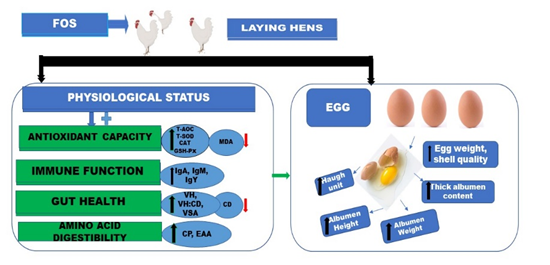Dietary Fructooligosaccharides Effectively Facilitate the Production of High-Quality Eggs via Improving the Physiological Status of Laying Hens
The Researchers from the Institute of Feed Research of Chinese Academy of Agricultural Sciences (IFR, CAAS), conducted a feeding trial to ascertain the use of natural feed additives such as Fructooligosaacharides (Prebiotics) in the diet of laying hens to enhance laying performance and produce high-quality eggs. It was published in Foods.
Laying hens are prone to oxidative stress and immunity challenges due to the environment and high metabolic demand owing to egg production. In this era of antibiotic-free diets in animal nutrition, supplementation of feed additives that can enhance intestine health, overall animal health and production of functional eggs which are safe for consumers becomes expedient.
The results showed that Fructooligosaccharides at 0.6% inclusion level in the diet of laying hens significantly increased laying performance by 4% with zero-mortality rate and increased albumen quality indices (Albumen height, weight, thick to thin albumen ratio and Haugh unit) and shell quality. The gut villi morphometrics (villi height, width, surface area, villi height to crypt depth, and reduced crypt depth) was significantly improved. The activities of antioxidant enzymes (T-SOD, catalase, GSH-pX, GSH) and total antioxidant capacity were increased and oxidative biomarker (MDA) was reduced and the immunoglobulins (IgA, IgM and IgG) were enhanced. The digestibility of key essential amino acids that are crucial to egg formation and albumen quality were also improved.
The research results suggest: (i) The prebiotic fermentation enhanced eggshell quality and content of thick albumen. (ii) Antioxidant capacity and immune function which culminated in protection of gut integrity from pathogens and oxidative stress, development of mucosal structures and improved nutrient utilization in the gut and consequently amino acid digestibility. (iii) The principal component analysis (PCA) lends more evidence to the strong correlation between the diets and the output observed in the study.
Original link: https://doi.org/10.3390/foods11131828

By Uchechukwu Edna Obianwuna (obinogodie@gmail.com)
-
 Apr 18, 2024Opening Ceremony of the Training Workshop on Wheat Head Scab Resistance Breeding and Pest Control in Africa Held in CAAS
Apr 18, 2024Opening Ceremony of the Training Workshop on Wheat Head Scab Resistance Breeding and Pest Control in Africa Held in CAAS -
 Apr 03, 2024IPPCAAS Co-organized the Training Workshop on Management and Application of Biopesticides in Nepal
Apr 03, 2024IPPCAAS Co-organized the Training Workshop on Management and Application of Biopesticides in Nepal -
 Mar 28, 2024Delegation from the School of Agriculture and Food Science of University College Dublin, Ireland Visit to IAS, CAAS
Mar 28, 2024Delegation from the School of Agriculture and Food Science of University College Dublin, Ireland Visit to IAS, CAAS -
 Mar 25, 2024Director of World Food Prize Foundation visited GSCAAS
Mar 25, 2024Director of World Food Prize Foundation visited GSCAAS -
 Mar 20, 2024Institute of Crop Sciences (ICS) and Syngenta Group Global Seeds Advance Collaborative Research in the Seed Industry
Mar 20, 2024Institute of Crop Sciences (ICS) and Syngenta Group Global Seeds Advance Collaborative Research in the Seed Industry
